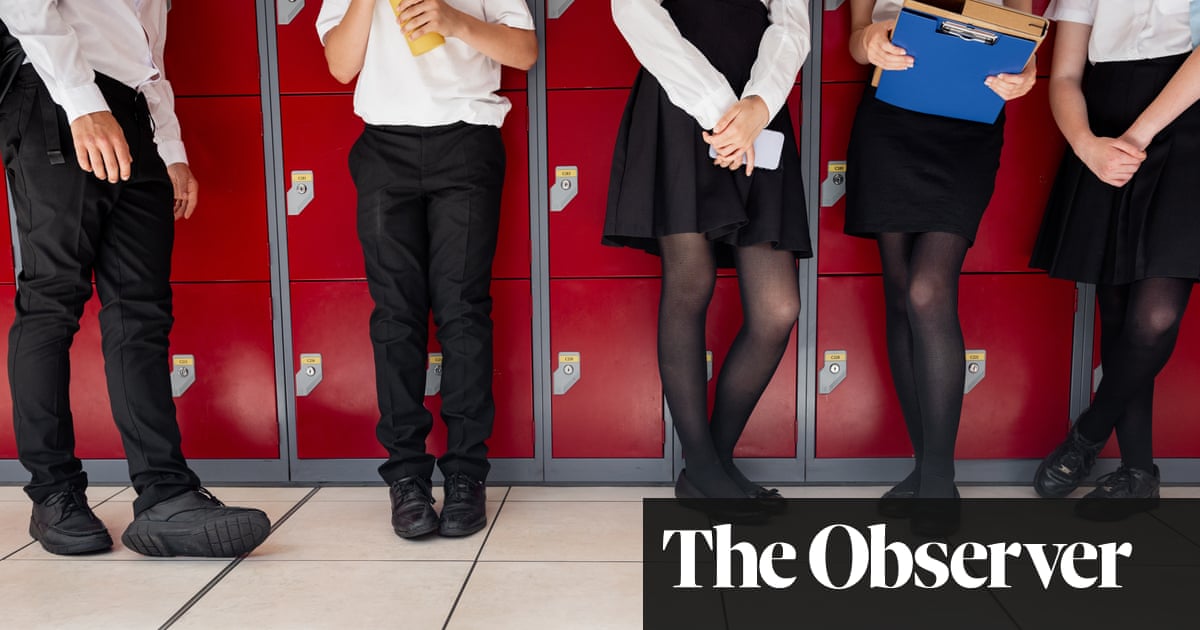
The suspension rate at some of England’s strictest academy schools is 30 times the national average, with experts warning that this is affecting some of the country’s most vulnerable children.
An Observer analysis of the latest Department for Education (DfE) annual data on suspensions has found that dozens of multi-academy trusts had suspension rates that far exceeded the national average in a number of their schools in 2021-22. Two of the country’s biggest trusts, Astrea and Outward Grange Academies Trust (OGAT), had schools with a suspension rate of about 200% of their pupil numbers – although some pupils were counted several times because they were suspended repeatedly – compared with a national average of 6.9%.
Meanwhile, new analysis has shown that suspensions across England hit a record high in autumn term 2022, with nearly a quarter of a million suspensions involving some 135,000 pupils. Exclusion rates were nearly back to pre-pandemic highs, with 3,104 pupils permanently excluded from school that term, according to analysis of DfE data by the Centre for Social Justice (CSJ) thinktank.
The CSJ also uncovered data using the Freedom of Information Act showing that pupil referral units (PRUs), where excluded pupils are often placed, are over-subscribed. This summer there was an excess of more than 800 pupils enrolled in PRUs than there were places.
Maureen McKenna, a former education director at Glasgow city council who has been hired by London’s Violence Reduction Unit to drive down exclusions, said: “The most common reason for suspensions and exclusions is persistent disruptive behaviour, but in some schools that starts with not bringing your pencil or refusing to take your jacket off.”
McKenna oversaw a drop of 90% in suspensions over 14 years in Glasgow, which coincided with violence halving in the city. She argues that while some suspensions are necessary, in some schools they have become an “easy option” rather than “helping young people to make better decisions”.
While many academy schools had suspensions at or below the national average in 2021-22, some of England’s most well-known “zero tolerance” trusts consistently far exceeding it. Astrea, which runs 26 schools and is considered an effective turnaround trust by the government, had a suspension rate of 255% at its Woodfields academy in Doncaster, 37 times the national average. The school, which is rated “Good” by Ofsted, suspended the equivalent of 33% of its pupils more than once. Other schools in the trust also made exceptionally high numbers of suspensions.
Teachers at Astrea’s St Ivo academy in Cambridgeshire walked out last month in protest over the trust’s behaviour policy, which includes silent corridors and silence in class “unless given permission to speak”.
A spokesperson for Astrea said after the pandemic it had seen a “significant increase in unsafe and inappropriate behaviours” and had had to “work hard to reset expectations on how young people behave”. Suspensions at Woodfield were down 29% this autumn, compared with the same term last year.
Meanwhile, OGAT – whose chief executive, Sir Martyn Oliver, will take over as Ofsted’s chief inspector in January, had nine schools whose suspension rate was over 75% in 2021-22. The rate at OGAT’s Ormesby academy in Middlesbrough was 202% and Normanby academy in the same town had a rate of 198%.
OGAT, which runs 41 schools in the north, has attracted criticism for its strict behaviour policies, including the use of isolation booths. Former teachers made allegations in 2019 about assemblies in which pupils were routinely humiliated and made to cry to enforce discipline. At the time OGAT said they did not “recognise the culture described”.
An OGAT spokesperson said: “Among our trust are schools in areas of high deprivation which had been underperforming for years and were some of the most challenging in the system when we took them on.”
The spokesperson described suspensions as “a last resort” so that “the majority of children who want to come to school to learn do not have their education disrupted”.
Frank Norris, education adviser to the Northern Power Partnership, said: “This data is revealing a lack of tolerance to some of some of the most marginalised children in the country.”
Anne Longfield, chair of the Commission on Young Lives and the government’s former children’s commissioner for England, warned that poorer children and those with special educational needs were more likely to be suspended or excluded, but “it also depends on the school you go to”.
She said: “Young people who end up being excluded are vulnerable to being exploited by criminal gangs, and their life chances are diminished.”
Longfield was also concerned that so-called “off-rolling”, where schools move more challenging pupils off their books, is now happening much more “covertly”.
“A really common pattern we’ve encountered is that something happens and parents are told their child is at risk of exclusion but if they don’t want it on their record they could always withdraw them,” she said.
Julie Price Grimshaw, a former Ofsted inspector who now advises schools, said: “In my experience, some academies would have much higher exclusion rates if they counted the parents who had felt pressurised to leave because their children kept being suspended.”
A spokesperson for the DfE said: “We back heads to use suspensions and permanent exclusions where required as part of behaviour management, so they can provide calm, safe, and supportive environments where both pupils and staff can work in safety and are respected.”











